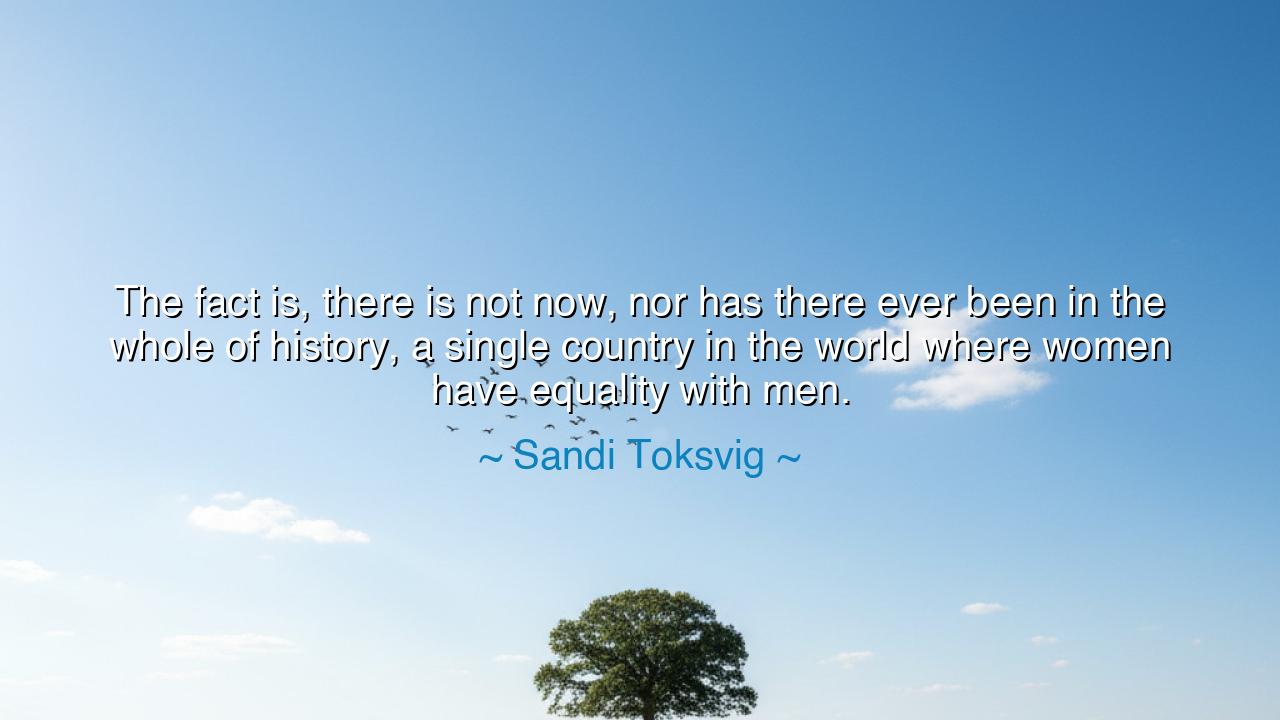
The fact is, there is not now, nor has there ever been in the
The fact is, there is not now, nor has there ever been in the whole of history, a single country in the world where women have equality with men.






In the piercing words of Sandi Toksvig, truth-teller and advocate for justice, we hear the lament of centuries: “The fact is, there is not now, nor has there ever been in the whole of history, a single country in the world where women have equality with men.” This declaration is not born of bitterness, but of clarity. It is a mirror held up to the world, reflecting both our progress and our failure. Through it, Toksvig calls upon the conscience of humankind to recognize that equality, though often spoken of, has yet to be fulfilled. Hers is not a cry of despair, but a trumpet that summons us to action—to complete the work that time and courage have begun but have never yet finished.
To understand the meaning of this quote, we must first confront the illusion that equality has already been achieved. In many lands, women vote, lead, and study beside men; they stand in parliaments and run great enterprises. Yet, beneath these triumphs lie invisible barriers—disparities in pay, in opportunity, in safety, and in respect. Toksvig reminds us that true equality is not the appearance of balance, but its substance. It is not measured in laws alone, but in the lived reality of every woman. As long as a single voice is silenced, a single girl denied education, or a single woman endangered for speaking her truth, equality remains a promise unfulfilled.
The origin of Toksvig’s conviction comes from both history and her own experience. As a broadcaster, writer, and activist, she has long stood at the crossroads of power and inequality. She has seen how the achievements of women—though great—are too often treated as exceptions, not expectations. But her insight stretches beyond one life or one nation. She speaks from a lineage of struggle that spans continents and ages: from the suffragettes who starved in English prisons to the revolutionaries who marched in Paris and the visionaries who stood in the rice fields of Asia or the deserts of Africa, demanding nothing more than to be seen as equal. Toksvig’s words gather all their cries into one: a testament that across all time and borders, woman has fought not for privilege, but for parity—for her rightful place in the human story.
Consider the story of Emmeline Pankhurst, the indomitable leader of the British suffragette movement. For daring to demand the vote, she was beaten, arrested, and reviled. Yet she and her sisters did not falter. Their battle won the ballot, but not full equality—for even today, women’s voices in government are fewer, their power still tempered by prejudice. Or look further back, to Hypatia of Alexandria, philosopher and astronomer of the ancient world, slain by those who feared a woman’s intellect. Her death is not merely an ancient tragedy—it is a symbol of the silence imposed upon women through all ages. From Hypatia to Malala Yousafzai, the story repeats: women rise, speak, and suffer, yet the world still withholds its full respect.
Toksvig’s assertion that no nation has yet achieved equality is both accusation and prophecy. It accuses those who grow complacent, who think progress means completion. Yet it also prophesies a future that can still be built. For if equality has never existed, it is not because it is impossible, but because humanity has not yet dared to live its own ideals. The dream has always been within reach—whispered by philosophers, sung by poets, fought for by mothers and daughters—but never fully grasped. And so, her words ring with urgency: we are still a species in the making, still learning what it means to honor the divine balance between man and woman.
The wisdom in Toksvig’s quote lies in her refusal to romanticize history. She sees clearly that patriarchy, though shifting in form, remains alive in every institution that diminishes women’s worth. Her challenge is not to condemn men, but to awaken both men and women to the truth that injustice is not destiny—it is habit. And habits can be broken. The chains that bind women are not forged by nature, but by culture, by silence, by the complacency of those who say “it is enough” when it is not. Her words, therefore, are a call to vigilance—to never mistake the glitter of progress for the gold of true justice.
The lesson, then, is both moral and practical. To build equality, one must do more than speak of it—one must live it. Parents must raise daughters and sons alike to see no difference in their potential; employers must measure worth by ability, not gender; governments must not merely legislate fairness but nurture it in every sphere of life. Each person, in their daily choices, must resist the ancient current that still pulls humanity toward inequality. The task is great, but it is sacred—for the balance of the world depends upon it.
Therefore, let Toksvig’s words be carried as a torch through the centuries: “There has never been a nation where women have equality with men.” It is both lament and commandment. It tells us where we are and where we must go. The ancients taught that harmony is the highest order of the universe—so too must it be in human society. When woman and man stand as equals, side by side, the world will at last reflect the justice that has long burned in the heart of the divine. Until that day, let us labor unceasingly, for equality is not merely a right—it is the fulfillment of what it means to be truly human.






AAdministratorAdministrator
Welcome, honored guests. Please leave a comment, we will respond soon